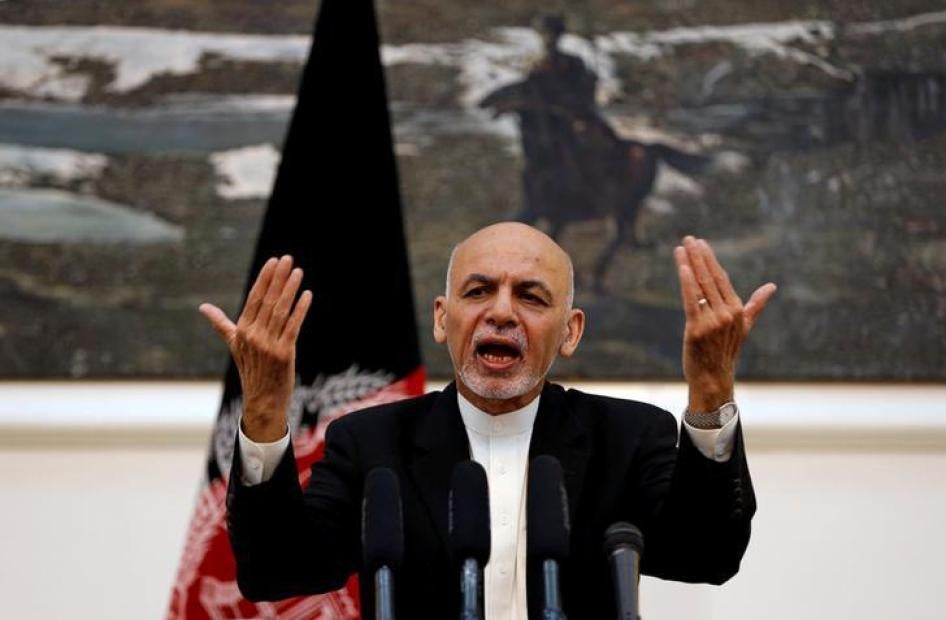Afghanistan’s President Ashraf Ghani really doesn’t want to talk about torture. He made that clear this month when, in a scene that could have been scripted for US President Donald Trump, he tried to shut down veteran Tolo news reporter Sharif Amiry for daring to ask what the Afghan government was doing about allegations that 1st Vice President Dostum had abducted, tortured and sexually assaulted a rival. But Ghani’s refusal to answer won’t make those concerns go away. And it begs an even more awkward question: Is his administration really incapable of enforcing the rule of law in even such a blatant case of alleged torture by one of its own top officials?
It has been four months since politician Ahmad Ishchi accused Dostum of abducting him and imprisoning him in Dostum’s stronghold in Shiberghan, where guards allegedly beat him and raped him with a rifle barrel.
At the time, Ghani assured Western diplomats that he would see justice done. In January, the attorney general ordered the arrest of nine of Dostum’s guards, but when Dostum refused to hand them over, the attorney general settled for interviewing seven of them in Dostum’s compound in Kabul. Today, the case remains stalled, with both Dostum and his bodyguards waiting out political negotiations over what has become not only a test case for Ghani’s ability to ensure justice, but a clear example of the power strongmen wield over Afghanistan’s future.
Dostum, however, is only part of the sordid picture of impunity for torture in Afghanistan.
In January 2015, President Ghani wrote to Human Rights Watch in response to our report on widespread impunity for Afghan security force officials responsible for torture, extrajudicial executions and forced disappearances. In Ghani’s words, the “Afghan government would not tolerate torture,” and he was “committed to addressing allegations of torture.” Further evidence of Ghani’s personal abhorrence for torture emerged when he read the US Senate torture report. Ghani reportedly demanded details on the number of Afghans tortured at US “black sites,” and condemned the methods used as “shocking” and “inhumane.” When the UN Assistance Mission to Afghanistan (UNAMA) released its February 2015 report showing that one-third of Afghan detainees had been tortured, Ghani announced a national action plan aimed at ending torture.
That was two years ago. Fast forward to now.
Draft legislation on torture is finally emerging after years of political and bureaucratic battles, but torture is on the rise. While in a few cases police have been dismissed or relocated following investigations, in places were torture is used systematically, the Afghan government has done nothing to hold the most egregious offenders accountable. Afghanistan’s strongmen, and the forces loyal to them, remain above the law. These include not only Dostum, but also Police Chief Raziq of Kandahar, among others. Human Rights Watch has documented cases of torture by other prominent political figures, including Asadullah Khalid, former head of the National Directorate of Security.
When I was in Kabul two weeks ago, a senior administration official tried to explain away the government’s failure to show any genuine improvements in combatting torture. He instead fell back on excuses for inaction, such as that the victims lie, the research methodology used to document torture is flawed, the Taliban fabricate stories of torture by government forces. But in truth, the Ghani administration has failed to curb torture because those implicated in such crimes wield sufficient power to ensure they are never prosecuted and are free to continue to commit such abuses without any fear of accountability.
Afghanistan faces its first review in 20 years under the UN Convention Against Torture at a session in Geneva next week. The Afghan government delegation is expected to dispute evidence that UNAMA and human rights organizations, including the Afghanistan Independent Human Rights Commission, have provided. But the fact remains that those who torture get away with it. When he read the US Senate torture report, President Ghani rightly observed that: “When a person is tortured in an inhumane way, the reaction will be inhumane. There can be no justification for these kinds of actions and inhumane torture in today’s world.” He called it “a vicious cycle”—prophetic words, perhaps, but a cycle he can break only by acknowledging what human rights investigators have said: “ Torture continues because there’s no real deterrent.” Impunity for the use of torture means that torture will continue.









